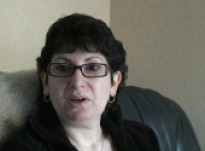Simone - Interview 4

More about me...
Simone and her husband have two daughters aged 12 and 15. In January 2006 Simone discovered a lump in her breast and went privately to have it examined. It was diagnosed as oestrogen positive cancer after a delay and Simone had two lumpectomies to remove the tumour and DCIS. After the second wound had healed, Simone began two regimes of chemotherapy for several months. The chemo caused Simone to feel very unwell and sick but she did not find losing her hair a big issue.
Some people don't understand that even though her cancer has been treated, Simone's fear remains that one day it might come back.
Some people don't understand that even though her cancer has been treated, Simone's fear remains that one day it might come back.
Is it still a big part of your life in terms of thinking about it?
It comes and it goes. With the first year after treatment was hard. It was on my mind every day. Now it isn’t on my mind every day and some days I even forget, you know, but this is the time of year when it comes back to me, because this is the time when I was going through all the investigations. And I got the official diagnosis on Valentine’s Day. So every year that’s a very strange day. We try to make it a positive day, you know, a day when I’m still here and as far as we know I’m free of cancer, so …
But yes. And also nine months after I finished my treatment, one of my very good friends was also diagnosed. So I have seen her go through it as well. But that was a positive thing for me, because I felt I could be there for her totally, whereas she and my other friends, had been absolutely fantastic, they couldn’t really understand, whereas I knew exactly what she was going through every step of the way. So …
And since then another friend, well she’s a friend of a friend. She’s a friend now, has also been through it. So … you know, when you see other people going through it, it’s obviously it’s on your mind. You can’t forget about it.
I don’t think so. I mean there are probably questions that nobody could answer, you know, I’d love somebody to be able to say to me, “Yes, we’ve got it all. You’ll be fine. It’s not going to come back.” I think that does bring me to something else which does annoy me. There’s a lot of ignorance out there and people think once you’ve been through all your treatment, that’s it, you’ve got the all clear, and why don’t you just get on with your life and forget about it. And I’ve even had that from a friend, not words to that extent, but she just doesn’t understand that there is a risk it could come back, and it’s a real risk, it’s not just similar to worry, and in the end you have to learn how to deal with that, and I do actually know somebody whose breast cancer is terminal, you know, she’s not a friend of mine, she’s a friend of a friend, and I know her to talk to, and I’ve seen her recently and she’s going through I think about her sixth course of chemo. But she’s been fighting that now for eleven years.
Simone decided to go privately for her cancer treatment. The care was excellent and 3 years later she still can phone if she has a question.
Simone decided to go privately for her cancer treatment. The care was excellent and 3 years later she still can phone if she has a question.
Simone thinks she got better information and post-operative support by going private for her breast cancer treatment.
Simone thinks she got better information and post-operative support by going private for her breast cancer treatment.
Did you think you were given enough information when you got the diagnosis?
Simone thinks support groups have their benefits but sometimes you need an expert opinion and a group of lay people cannot replace that.
Simone thinks support groups have their benefits but sometimes you need an expert opinion and a group of lay people cannot replace that.
Well I think the trouble with forums is, you’re not getting an expert’s response, you’re just getting other people’s views, and I think people have very different experiences and somebody may have found something they think is another lump and they might perhaps that’s it, they’re worried. Somebody else could just respond, “Oh yes, that happened to me. And yes, it was cancer.” Well I don’t think that’s going to help this person, because theirs might not be. This friend who had the lobular cancer, she had a mastectomy on one side, and she felt something in the other breast. And then there is definitely a mass there and she had to go and have that investigated, and thank goodness it turned out not to be cancer, but the last thing you want to be told is oh yes, that happened to me, and yes, it was. So, I think, they do have their benefits but you’ve got to be careful. I think sometimes you can come off the internet feeling worse then when you went on.

